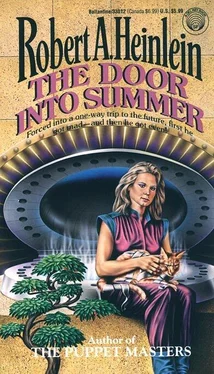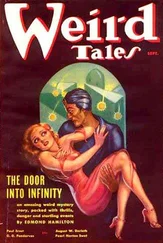Robert Heinlein - Door Into Summer
Здесь есть возможность читать онлайн «Robert Heinlein - Door Into Summer» весь текст электронной книги совершенно бесплатно (целиком полную версию без сокращений). В некоторых случаях можно слушать аудио, скачать через торрент в формате fb2 и присутствует краткое содержание. Жанр: Фантастика и фэнтези, на английском языке. Описание произведения, (предисловие) а так же отзывы посетителей доступны на портале библиотеки ЛибКат.
- Название:Door Into Summer
- Автор:
- Жанр:
- Год:неизвестен
- ISBN:нет данных
- Рейтинг книги:3 / 5. Голосов: 1
-
Избранное:Добавить в избранное
- Отзывы:
-
Ваша оценка:
- 60
- 1
- 2
- 3
- 4
- 5
Door Into Summer: краткое содержание, описание и аннотация
Предлагаем к чтению аннотацию, описание, краткое содержание или предисловие (зависит от того, что написал сам автор книги «Door Into Summer»). Если вы не нашли необходимую информацию о книге — напишите в комментариях, мы постараемся отыскать её.
Door Into Summer — читать онлайн бесплатно полную книгу (весь текст) целиком
Ниже представлен текст книги, разбитый по страницам. Система сохранения места последней прочитанной страницы, позволяет с удобством читать онлайн бесплатно книгу «Door Into Summer», без необходимости каждый раз заново искать на чём Вы остановились. Поставьте закладку, и сможете в любой момент перейти на страницу, на которой закончили чтение.
Интервал:
Закладка:
Pete lived through it for a similar reason. I had a buddy, Miles Gentry, a veteran called back to duty. He had married a widow with one daughter, but his wife had died about the time he was called back. 1-fe lived off post with a family in Albuquerque so as to have a home for his stepchild Frederica. Little Picky (we never called her "Frederica") took care of Pete for me. Thanks to the cat-goddess Bubastis, Miles and Picky and Pete were away on a seventy-two that awful weekend-Ricky took Pete with them because I could not take him to Dallas.
I was as surprised as anyone when it turned out we had divisions stashed away at Thule and other places that no one suspected. It had been known since the `30s that the human body could be chilled until it slowed down to almost nothing. But it had been a laboratory trick, or a last-resort therapy, until the Six Weeks War. I'll say this for military research: if money and men can do it, it gets results. Print another billion, hire another thousand scientists and engineers, then in some incredible, left-handed, inefficient fashion the answers come up. Stasis, cold sleep, hibernation, hypothermia, reduced metabolism, call it what you will- the logistics-medicine research teams had found a way to stack people like cordwood and use them when needed. First you drug the subject, then hypnotize him, then cool him down and hold him precisely at four degrees centigrade; that is to say, at the maximum density of water with no ice crystals. If you need him in a hurry he can be brought up by diathermy and posthypnotic command in ten minutes (they did it in seven at Nome), but such speed tends to age the tissues and may make him a little stupid from then on. If you aren't in a hurry two hours minimum is better. The quick method is what professional soldiers call a "calculated risk."
The whole thing was a risk the enemy had not calculated, so when the war was over I was paid off instead of being liquidated or sent to a slave camp, and Miles and I went into business together about the time the insurance companies started selling cold sleep.
We went to the Mojave Desert, set up a small factory in an Air Force surplus building, and started making Hired Girl, my engineering and Miles's law and business experience. Yes, I invented Hired Girl and all her kinfolk-Window Willie and the rest-even though you won't find my name on them. While I was in the service I had thought hard about what one engineer can do. Go to work for Standard, or du Pont, or General Motors? Thirty years later they give you a testimonial dinner and a pension. You haven't missed any meals, you've had a lot of rides in company airplanes. But you are never your own boss. The other big market for engineers is civil service-good starting pay, good pensions, no worries, thirty days annual leave, liberal benefits. But I had just had a long government vacation and wanted to be my own boss.
What was there small enough for one engineer and not requiring six million man-hours before the first model was on the market? Bicycle-shop engineering with peanuts for capital, the way Ford and the Wright brothers had started-people said those days were gone forever; I didn't believe it.
Automation was booming-chemical-engineering plants that required only two gauge-watchers and a guard, machines that printed tickets in one city and marked the space "sold" in six other cities, steel moles that mined coal while the 13MW boys sat back and watched. So while I was on Uncle Sam's payroll I soaked up all the electronics, linkages, and cybernetics that a clearance would permit.
What was the last thing to go automatic? Answer: any housewife's house. I didn't attempt to figure out a sensible scientific house; women didn't want one; they simply wanted a better upholstered cave. But housewives were still complaining about the Servant Problem long after servants had gone the way of the mastodon. I had rarely met a housewife who did not have a touch of slaveholder in her; they seemed to think there really ought to be strapping peasant girls grateful for a chance to scrub floors fourteen hours a day and eat table scraps at wages a plumber's helper would scorn.
That's why we called the monster Hired Girl-it brought back thoughts of the semi-slave immigrant girl whom Grandma used to bully. Basically it was just a better vacuum cleaner and we planned to market it at a price competitive with ordinary suck brooms.
What Hired Girl would do (the first model, not the semi-intelligent robot I developed it into) was to clean floors... any floor, all day long and without supervision. And there never was a floor that didn't need cleaning.
It swept, or mopped, or vacuum-cleaned, or polished, consulting tapes in its idiot memory to decide which. Anything larger than a BB shot it picked up and placed in a tray on its upper surface, for someone brighter to decide whether to keep or throw away. It went quietly looking for dirt all day long, in search curves that could miss nothing, passing over clean floors in its endless search for dirty floors. It would get out of a room with people in it, like a well-trained maid, unless its mistress caught up with it and flipped a switch to tell the poor thing it was welcome. Around dinnertime it would go to its stall and soak up a quick charge-this was before we installed the everlasting power pack.
There was not too much difference between Hired Girl, Mark One, and a vacuum cleaner. But the difference-that it would clean without supervision-was enough; it sold.
I swiped the basic prowl pattern from the "Electric Turtles" that were written up in Scientific American in the late forties, lifted a memory circuit out of the brain of a guided missile (that's the nice thing about top-secret gimmicks; they don't get patented), and I took the cleaning devices and linkages out of a dozen things, including a floor polisher used in army hospitals, a soft-drink dispenser, and those "hands" they use in atomics plants to handle anything "hot." There wasn't anything really new in it; it was just the way I put it together. The "spark of genius" required by our laws lay in getting a good patent lawyer.
The real genius was in the production engineering; the whole thing could be built with standard parts ordered out of Sweet's Catalogue, with the exception of two three-dimensional cams and one printed circuit. The circuit we subcontracted; the cams I made myself in the shed we called our "factory," using war-surplus automated tools. At first Miles and I were the whole assembly line- bash to fit, file to hide, paint to cover. The pilot model cost $4317.09; the first hundred cost just over $39 each-and we passed them on to a Los Angeles discount house at $60 and they sold them for $85. We had to let them go on consignment to unload them at all, since we could not afford sales promotion, and we darn near starved before receipts started coming in. Then Life ran a two-page on Hired Girl... and it was a case of having enough help to assemble the monster.
Belle Darkin joined us soon after that. Miles and I had been pecking out letters on a 1908 Underwood; we hired her as a typewriter jockey and bookkeeper and rented an electric machine with executive type face and carbon ribbon and I designed a letterhead. We were ploughing it all back into the business and Pete and I were sleeping in the shop while Miles and Ricky had a nearby shack. We incorporated in self-defense. It takes three to incorporate; we gave Belle a share of stock and designated her secretary-treasurer. Miles was president and general manager; I was chief engineer and chairman of the board... with 51 per cent of the stock.
I want to make clear why I kept control. I wasn't a hog; I simply wanted to be my own boss. Miles worked like a trouper, I give him credit. But better than 60 per cent of the savings that got us started were mine and 100 per cent of the inventiveness and engineering were mine. Miles could not possibly have built Hired Girl, whereas I could have built it with any of a dozen partners, or possibly without one-although I might have flopped in trying to make money out of it; Miles was a businessman while I am not
Читать дальшеИнтервал:
Закладка:
Похожие книги на «Door Into Summer»
Представляем Вашему вниманию похожие книги на «Door Into Summer» списком для выбора. Мы отобрали схожую по названию и смыслу литературу в надежде предоставить читателям больше вариантов отыскать новые, интересные, ещё непрочитанные произведения.
Обсуждение, отзывы о книге «Door Into Summer» и просто собственные мнения читателей. Оставьте ваши комментарии, напишите, что Вы думаете о произведении, его смысле или главных героях. Укажите что конкретно понравилось, а что нет, и почему Вы так считаете.










